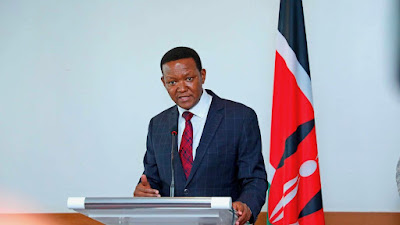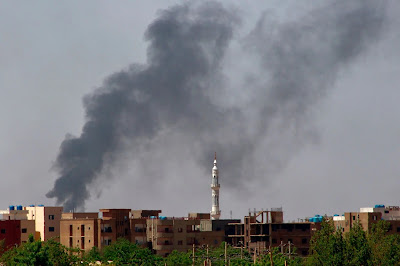By Matina Stevis-Gridneff
Matina Stevis-Gridneff, a former guest at Khartoum’s Acropole Hotel, traveled to Athens to interview Thanasis Pagoulatos after his evacuation.
Published 16 June 2023 - here is a full copy:
He Ran Sudan’s Most Storied Hotel. Then He Had to Leave Everything Behind.
Thanasis Pagoulatos led the family business, Khartoum’s oldest inn, through decades of tumult. Sudan’s latest breakdown proved too much.
Image: Thanasis Pagoulatos, whose family built up the historic Acropole Hotel in Khartoum, was forced to evacuate Sudan in April. Credit...Eirini Vourloumis for The New York Times
Even as fighter jets tore through Khartoum’s skies in April and the streets became a dystopian war zone amid a showdown between rival Sudanese fighters, Thanasis Pagoulatos had no intention of fleeing.
Born 79 years ago to a Greek immigrant father and a mother from Egypt’s Greek diaspora, Mr. Pagoulatos had really known only one home: Sudan.
That’s where his family had put down deep roots, growing a business, the Acropole Hotel, that flourished through decades of near-constant upheaval. They were part of a thousands-strong Greek community that became integrated into Sudan and stayed on after the country’s independence from British colonial rule in 1956.
Through it all, life in that vast land went on — and so did the Acropole.
Housed in an inconspicuous mustard-colored building in downtown Khartoum, the hotel teemed with archaeologists, journalists, humanitarians and adventurous travelers.
Image: The Acropole Hotel in Khartoum, in late April. Credit...Pavlos Pagoulatos, via Reuters
The Pagoulatos father, Panaghis, opened it in 1952, after arriving in Sudan seeking a better life as his native Greek island of Cephalonia lay in the ruins of the Second World War.
But the elder Pagoulatos died suddenly, leaving the hotel and other businesses in the hands of his powerhouse wife, Flora, and their three sons, Thanasis, 19 at the time, and the younger George and Makis.
The brothers, under the guidance of their mother, focused on family hospitality rather than luxury, and established the Acropole Hotel as a vital node in Sudan’s interactions with the outside world.
While offering basic accommodation — pristine but bare rooms, three square meals, consistent air-conditioning in temperatures regularly soaring over 100 degrees Fahrenheit — the family made the place a home. Guests flocked and returned, spurning fancier, bigger hotels.
Flora Pagoulatos died in 2010, but Mr. Pagoulatos and his brothers, their wives and later their children continued to run the hotel. Regular guests remembered each brother’s unique personality.
George, the middle one, was charming and discreet, an unflappable problem-solver. Makis, the youngest, was energetic and steadfast, and when Greece shut down its embassy in 2015, he became honorary consul, and the Acropole, the consulate. Thanasis was gentle and meticulous, paying attention to detail.
In his eight decades in Khartoum, Thanasis Pagoulatos — a tall man with soft white hair, blue eyes and a gentle voice — saw it all: coups (nearly a dozen), wars (civil, and with neighbors), famines (two).
In May 1988, he was in the hotel when a terrorist detonated a bomb, killing seven guests. With his brothers, he moved the whole business to the hotel’s annex across the street and carried on.
Image: Photographs of the original site of the Acropole Hotel, after it was bombed in May 1988. Credit...Eirini Vourloumis for The New York Times
When, in mid-April, heavy fighting broke out between the country’s army and the powerful paramilitary Rapid Support Forces, Mr. Pagoulatos cooped up in the hotel with his sister-in-law Eleonora, three staff members and four guests, and waited. Makis was in Greece at the time, and the hotel’s 50 rooms were mostly unoccupied, in part because of security concerns.
“We thought, ‘It will pass, it always does,’” he said in a recent interview in Athens, where he reluctantly evacuated to join the rest of his family.
Losing his beloved brother George, Eleonora’s husband, months earlier had already made this a terrible period for the Pagoulatoses. How much worse could it possibly get? It turned out, quite a lot.
For the first few days of the fighting, encouraged by Mr. Pagoulatos, the group — one Sudanese and two Philippine staff members, two German tourists, and a Brazilian and an Italian archaeologist — stayed calm.
They had no running water or electricity, but the kitchen had a basic stock of food and drinking water. Mr. Pagoulatos couldn’t fully fathom the chaos that was spreading across his beloved city, but he did know that it was at his doorstep.
Image: Khartoum at the beginning of May. Credit...Mohamed Nureldin Abdallah/Reuters
Fighters would barge in demanding food or drinks and Mr. Pagoulatos obliged, to keep the group safe. At night, he recalled with terror, men rattled the padlocked front door.
Responsibility for his guests and staff weighed on him. “I felt that these people stayed with us, and through no fault of their own, they were in this situation,” he said. “Who would look after them? It had to be us.”
As civilians in Khartoum desperately sought help, and embassies rushed to get their staffs out, a small global tribe connected by the Acropole scrambled for news of Mr. Pagoulatos.
Central to that was Roman Deckert, a German researcher who first stayed at the hotel in 1997 and returned over the years, developing a bond with the family and recording their history.
Throughout their childhood in Khartoum, the Pagoulatos brothers often visited their father’s ancestral land in Greece. But Mr. Pagoulatos said he always yearned to return to Sudan. When he and his brothers were grown and married, they all lived near the hotel in the same building, and their children were raised like siblings, not cousins.
Mr. Pagoulatos was raised speaking Greek, Arabic and English. But he also picked up French and Italian, which came in handy at the hotel because over the decades, the family’s worldliness and interest in culture made the Acropole a hub and a symbol of Sudan’s cosmopolitanism. Before the application of Islamic law, the hotel held regular music events, and film nights on its breezy terrace.
“They made it easy for Westerners and other Africans to fall in love with Sudan and the Sudanese,” Mr. Deckert said. “They played a huge role in relaying a brighter side of Sudan to the world.”
Image: Mr. Pagoulatos and his brothers, as well as their wives and later their children, made the hotel a home. Credit...Eirini Vourloumis for The New York Times
For travelers like Dale Raven North, a Canadian lawyer who stayed at the Acropole last November, Mr. Pagoulatos and his family offered a haven. “It ended up being, I think, my favorite place I have ever stayed because of the Pagoulatos family and the environment they created,” she said.
For international correspondents, the Acropole was a home. Lindsey Hilsum, the British broadcaster, said in an interview from eastern Ukraine that she stayed at the Acropole during the 1980s, drawn by reasonable rates, safety and a telex machine that correspondents fought over to file dispatches.
For archaeologists, Mr. Pagoulatos and his brothers created a launchpad for decades of expeditions that uncovered treasures and secrets of the evolution of mankind.
“It is not an exaggeration to say that nearly none of the foreign archaeological projects in Sudan would have functioned without them,” said the Munich-based archaeologist Kate Rose.
After 10 days holed up in the Acropole, Mr. Pagoulatos and the others with him were out of food and water. Through a contact at the Italian Embassy, they had been put on an evacuation list, and he got permission from the militiamen to set out on foot into the heat and dust of a devastated Khartoum. The group of nine walked past decomposing bodies, slowly taking in the full scale of the calamity.
Along the way, an elderly Sudanese man — “an angel,” Mr. Pagoulatos said — invited them into his home. The next morning, he found them a car to take them to an evacuation assembly point.
Mr. Pagoulatos and his sister-in-law were flown by the French military to neighboring Djibouti. Since they reached Athens, Mr. Pagoulatos, still shaken and emotional, has been feeling relief, but also a desire to go home to Khartoum.
“We left behind an icon of Jesus that survived the 1988 terrorist attack, and the big collage that the nongovernmental organizations gave us for our help during the famine,” Mr. Pagoulatos said.
“We need to get them,” he said. “We just thought we’d help the guests leave and go back to work two or three days later.”
A correction was made on June 16, 2023: An earlier version of this article misstated the year that Sudan gained independence from Britain and the year that the Acropole opened. Sudan gained independence in 1956, and the hotel opened in 1952, not the other way around.
Matina Stevis-Gridneff is the Brussels bureau chief, leading coverage of the European Union. She joined The Times in 2019. @MatinaStevis
A version of this article appears in print on June 17, 2023, Section A, Page 4 of the New York edition with the headline: A Lifetime of Hospitality, Disrupted by War in Sudan. Order Reprints | Today’s Paper | Subscribe
READ 41 COMMENTS
View original and 41 comments here:
https://www.nytimes.com/2023/06/16/world/africa/sudan-war-khartoum-acropole-hotel.html
[Ends]


.jpeg)
.jpeg)

.jpeg)
.jpeg)











